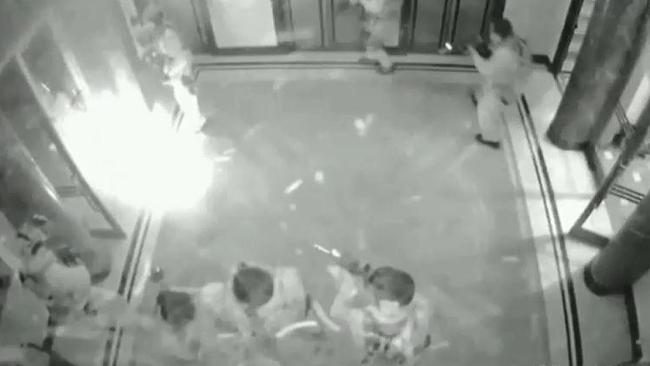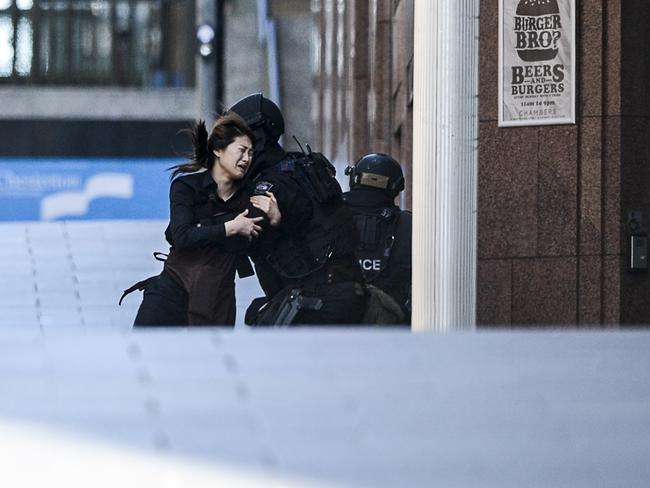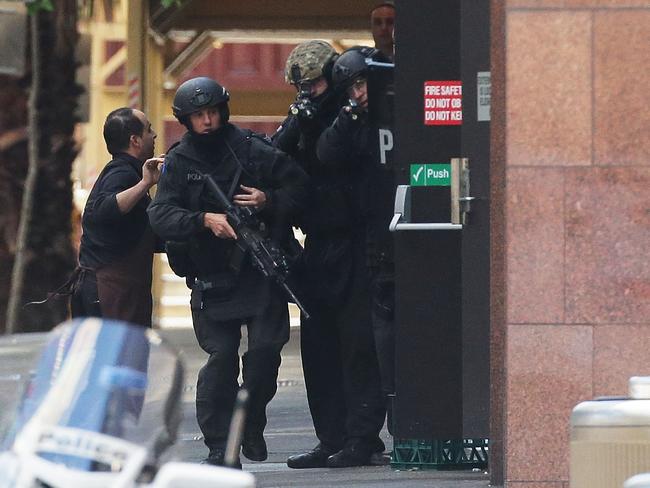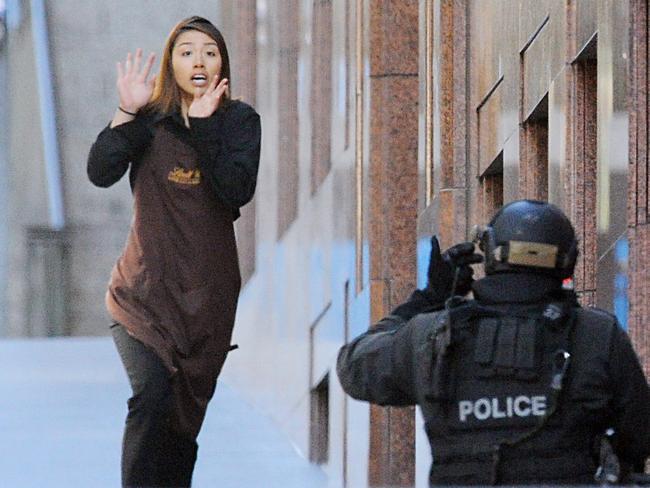Counter terrorism training for police negotiators cut back before Sydney siege
THE families of slain Lindt Cafe siege victims have formally applied to give evidence at the inquest.

THE families of slain Lindt Cafe siege victims have formally applied for NSW Police Commissioner Andrew Scipione, deputy commissioner Cath Burn and senior officer Jeff Loy to give evidence at the inquest.
The inquest into the deaths arising from the siege today heard the families of cafe manager Tori Johnson and barrister Katrina Dawson had written letters “asking that Ms Burn, Mr Lloyd and Mr Scipione all be called”.
Coroner Michael Barnes heard Ms Burn would be asked to provide a full statement before an earlier decision not to call her to the stand would be reviewed.
Ms Burn is the head of the special operations and counter terrorism unit, which managed the response to the Lindt Cafe siege on December 15, 2014.
Counsel assisting the inquest Jeremy Gormly said he hadn’t considered it “sufficient” based on earlier evidence to call Ms Burn to the inquest despite her “having been the principal media face for the police during the course of the siege”.
But he said two pieces of oral evidence that have recently emerged concerning “the presence of Ms Burn during the siege progress” have given cause to review the decision.
He didn’t clarify which pieces of evidence he was referring to.

“In her particular case in the light of the two elements of evidence which have emerged since the original decision concerning Ms Burn, the position has altered or at least, it’s under review and we’re in the process of getting documents that might relate to her,” Mr Gormly said.
“The true or forensic level other involvement is yet to be determined.”
Last month the inquest heard that police commissioner Andrew Scipione had reinforced during the Lindt Cafe siege that storming the stronghold was only to be done as a “last resort”.
There has been much debate over whether or not lives could have been saved if police stormed the building before Mr Johnson was executed at point blank range.
It was the first time the direct involvement of Mr Scipione and Ms Burn in the management of the deadly siege had been confirmed.
“As to Mr Scipione and Loy, that’s being examined as well,” Mr Gormly told the inquest today,
“Personally I regard them in a slightly different category (to Burn) from a forensic point of view but nevertheless those positions will be examined.
“ And from all the information being obtained a decision based on their role and forensic utility can be made concerning any of those witnesses having regard to the role they may have played ... It’s being examined.”
EARLIER:
COUNTER terrorism training for police negotiators has been scaled back by half because of financial constraints, the inquest heard.
NSW Police Negotiation Unit Commander, codenamed Graeme, entered his third consecutive day of giving evidence at the inquest into the deaths arising from the Lindt Cafe siege today.
He told the inquest that the state’s 100 police negotiators used to get counter terrorism training twice a year but that years prior to the siege the courses had been scaled back to once a year.
The cuts are still in place today following the terrorist incident at the Lindt Cafe and despite terrorism posing a significant risk to national security.
“The national platform for training police negotiators and bringing these types of incidents to their attention ran twice a year however that was cut back to once a year,” Graeme said.
“A national platform (with) the commanders of each jurisdiction through the negotiation capability have been developing another way of trying to best inform police negotiators.
“(We now) have what’s known as a ‘police negotiators working meeting’ to rotate around the country to provide information intelligence and case studies and updates in what’s taking place in the world of terrorism to try and upskill, update large numbers of negotiations within each jurisdiction of the country.”

One “pilot course or workshop” has taken place since the siege, according to Graeme.
“There are plans to make sure that takes place in the future,” he told the inquest.
Senior police negotiator and team leader ‘Reg’, his pseudonym, earlier revealed at the inquest that he had a total of four weeks’ training in negotiation and a counter-terrorism course that covered “Islam 101” prior to the siege.
Reg said he had completed the counter-terrorism training in 2001, and had also attended refresher courses in 2004 and 2008.
He attended four weeks of training in negotiation over three years.
The inquest has heard mounting evidence of police miscommunication and shocking details about how the negotiation unit had limited resources and a lack of access to vital equipment on the day of the siege.
The inquest yesterday heard that Graeme was actively engaged in at least four other incidents even as gunman Man Haron Monis was holding 18 hostages inside the Lindt Cafe.
It was earlier revealed that desperate calls from Lindt Cafe siege hostages went unanswered because the state’s only negotiation truck, equipped with everything police negotiators needed to operate, was unavailable.
The truck hasn’t been available since 2011, the inquest has heard.
The negotiation team was forced to operate out of the gaming manager’s office at the NSW Leagues Club during the siege.
Graeme today said the only extra resource the negotiation unit had been granted since the siege in December 2014 was one extra position for an experienced negotiator.
Graeme said general police negotiation training runs over several years via a separate country and city program. He said the courses allowed for about 16 people in each and did not run annually.

The inquest into the stand-off at the Lindt Cafe has also heard that prior to the Martin Place incident, no arrangements had been put in place to prepare for the likelihood of a politically motivated attack or terrorism event.
In September 2014, three months before Monis took control of the cafe, the Australian terror alert level was raised to high — meaning the risk of an attack is likely — because of the number of Australians “fighting with and supporting” terrorist groups in the Middle East.
But Graeme has conceded that nothing was done to update the strategy his team took in dealing with incidents involving terrorism.
“For at least 10 years prior, do you agree with me that Australia had been preparing its police forces to deal with some sort of terrorist attack?” Dr Dwyer asked.
“Yes,” Graeme responded.
Dr Dwyer: “So, prior to the Martin Place incident, am I right in suggesting to you that no arrangements had been put in place so that in the event of a politically motivated (attack) ... or terrorism, there was anything different about the way a negotiation strategy was decided?”
Graeme: “Yes. I would agree with that.”
At the time the terror alert was raised, in September 2014, the director-general of the Australian Security and Intelligence Organisation David Irvine warned of increasing concerns about the threat of terrorism.
He said the threat could manifest itself in “many ways”, including in a bombing similar to the one in a Bali nightclub in 2002.




